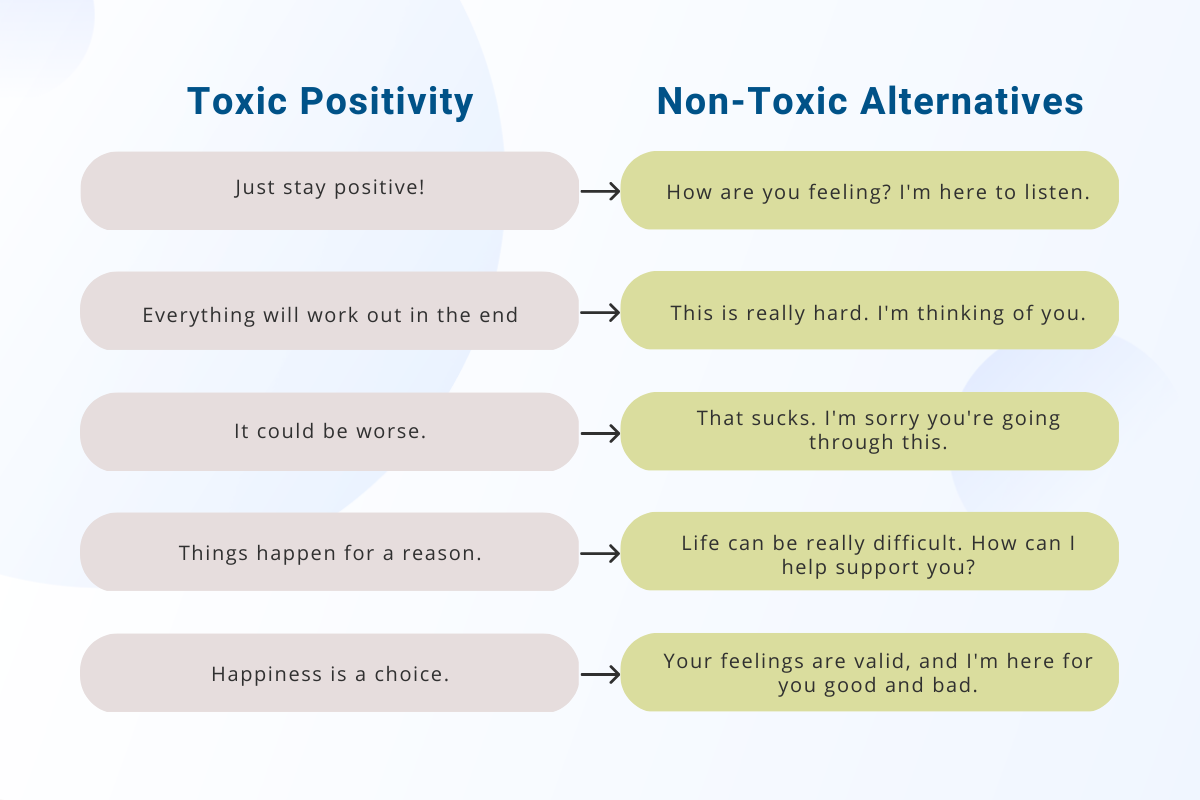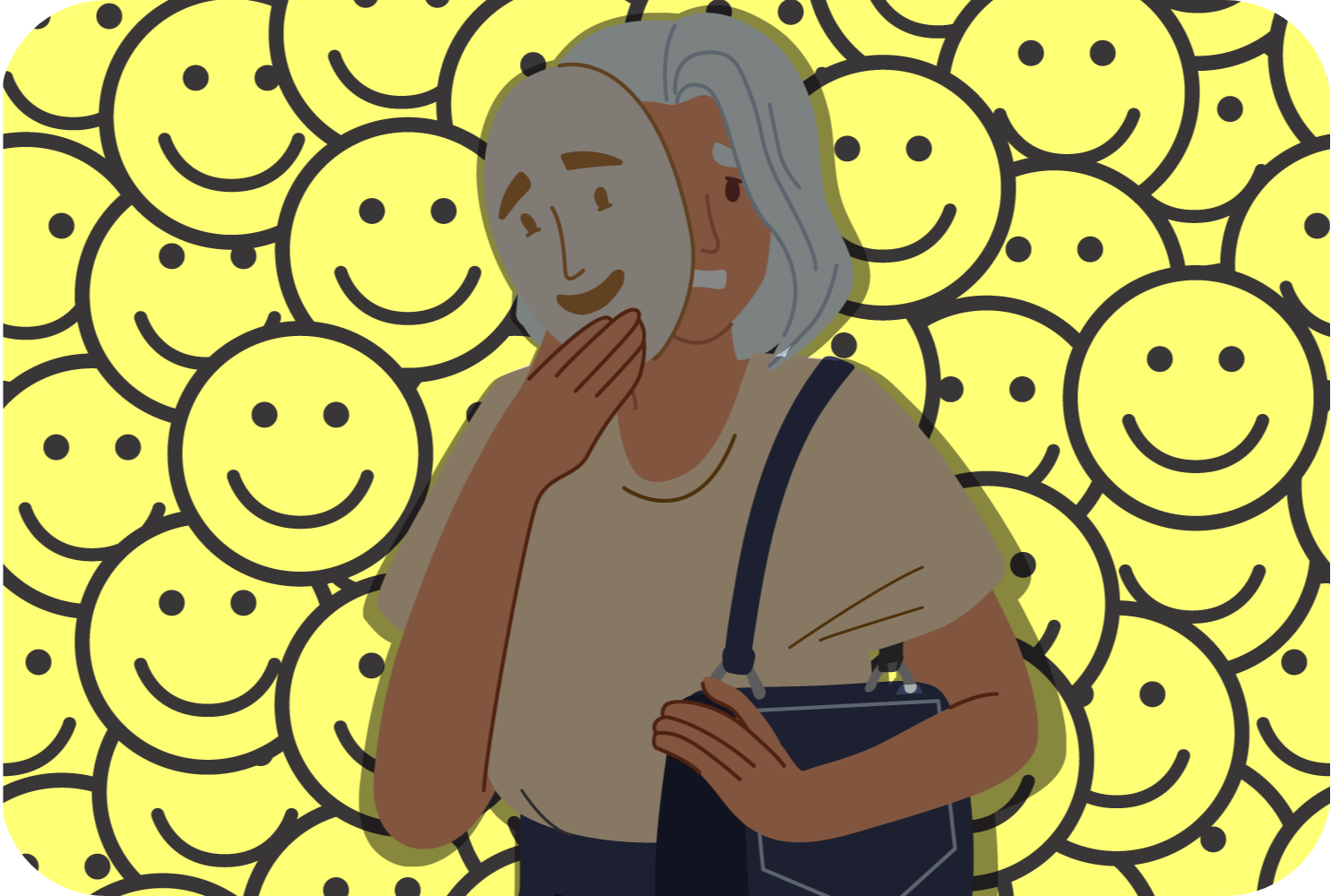When does positivity turn toxic?
Healthy Positivity: An abundance of research shows that gratitude and optimism can help you live a happier life. Healthy positivity has a balanced view of the human experience, acknowledging hardships and choosing to find meaning or hope in life’s struggles.
- Encourages an optimistic outlook while recognizing that life isn’t always easy or positive.
- Holds space for conflicting emotions. For example, accepting that you can be fearful about a job loss and hopeful you’ll find a better opportunity.
- Understands that support means accepting and validating uncomfortable emotions.
Toxic Positivity: Toxic positivity prioritizes the importance of a cheerful disposition. It steamrolls over uncomfortable emotional situations, using trite sayings to dismiss and minimize painful emotions in a misguided attempt at encouragement.
- Compulsively pushes shallow feel-good sayings to avoid addressing or expressing negative emotions.
- Demands positivity regardless of hardships.
- Denies authentic support by rejecting all negative emotional experiences. For example, telling someone how they should or shouldn’t feel using phrases such as “you should be grateful” or “you shouldn’t dwell on loss.”
Toxic positivity takes you off the hook for being present with someone’s uncomfortable emotions.
Spotting toxic positivity
Toxic positivity is often intended to be sympathetic, but it shuts down empathetic, authentic conversations. Here are a few examples of how it can sound:
- Telling someone to “look on the bright side” or “just stay positive” when they are going through a divorce. This approach shuts down the opportunity for them to express how they’re doing.
- Saying “everything happens for a reason” when someone experiences a loss. Your intention may be to comfort, but you’re actually avoiding the person’s pain.
- Brushing off and minimizing someone’s concerns by saying, “it could be worse.”
- Urging someone to focus on the positive aspects of a devastating loss. For example, pressuring someone to use the time during the pandemic lockdown to be productive or learn a new skill can cause them to feel ashamed when they’re struggling to make it through each day.
- Declaring that “happiness is a choice” when someone is dealing with depression. It’s a judgmental phrase that implies it is the person’s fault for not ‘choosing’ happiness.

What makes toxic positivity so harmful?
Toxic positivity minimizes, rejects, and discounts the expression of negative emotions. It causes the person reaching for connection to feel dismissed – as if their experiences or feelings don’t matter. Pushing a “good vibes only” approach suggests that anything other than positivity is shameful or wrong, silencing people’s struggles and deterring them from reaching for support. Below are a few ways toxic positivity harms those you’re trying to help:
Shame and low self-esteem: toxic positivity tells you that you should be able to maintain a positive outlook. If you can’t, you must be weak, inadequate, or doing something wrong.
Ignores harm: only focusing on the positive side encourages you to ignore red flags and can cause you to underestimate the severity of a situation. For example, if someone is in an abusive relationship and repeatedly hears, “it could be worse. At least they provide for you financially,” it could lead them to believe the situation isn’t that bad and choose to stay in a dangerous relationship.
Demeans loss: hearing “you need to move on” or “they would want you to be happy” after losing a loved one makes it seem like your sorrow is a burden and that others don’t care about your loss. The loss of your loved one and the realization that your loss is insignificant to others compounds the feeling of grief.
Harms health: sidestepping uncomfortable emotions won’t make them disappear. The more you try to repress or avoid them, the harder they are to ignore. Suppressing your emotions inhibits your cognitive functioning, intensifies your physiological stress response, and increases your risk of physical and mental health problems. On the contrary, expressing your emotions helps regulate your stress response.
Prevents growth: turning a blind eye to life’s hardships is a form of black-and-white thinking that doesn’t provide a realistic view of life. It hampers your emotional development. After all, how can you learn to cope if you won’t even acknowledge reality? Facing discomfort and learning from your emotions can lead to important insights and help you make the best decisions for your life.
Creates communication issues: without vulnerability, you cannot be genuine in your relationships. Ignoring challenges and only focusing on the positive prevents you from communicating your reality and being authentic. You lose touch with yourself by denying your truth, making it difficult to relate to and connect with others.
Are you projecting toxic positivity?
There’s nothing wrong with looking on the bright side of life. But when the bright side becomes the only side you’re willing to acknowledge, it becomes a problem. Use the checklist below to identify if your positivity is problematic. Do you:
- Brush off issues rather than face them?
- Hide real emotions behind insincere feel-good sayings?
- Dismiss or minimize others’ emotions when you feel uncomfortable? For example, when someone approaches you with a heavy heart, do you leverage socially acceptable quotes to wrap up the conversation and quickly move on?
- Shame others when they don’t have a positive attitude?
Signs someone is projecting toxic positivity onto you
When you seek support, do you refrain from sharing your genuine emotions or leave conversations feeling worse? How you feel is a good indicator that someone is projecting toxic positivity.
Do you:
- Feel guilty about being sad, angry, jealous, disappointed, or resentful?
- Disguise how you really feel?
- Bury emotions or brush off what bothers you with “it is what it is”?
Look out for thoughts that include words like “should” or “must”, because it can be an indication of an unhelpful expectation. The belief that “I should be having good vibes only” is setting an expectation that is extreme and unhelpful. Moving away from extreme positions to a place of balance improves our mental health and overall wellbeing.
What to do instead
Mindfulness involves intentionally paying attention to the present moment. Recognizing and nonjudgmentally putting a name on how you feel enables you to cultivate awareness and acceptance of your emotional experience. Honor your feelings and practicing accepting them – especially the difficult ones.
Verbalizing and expressing your emotions helps regulate your stress response. Talking about how you’re doing reduces feelings of overwhelm and relieves tension caused by suppressing your emotions. It allows you to process information more easily. A brain imaging study at UCLA showed that putting feelings into words reduces the intensity of emotions such as sadness, anger, and pain.
Adjust your attitude by recognizing that it’s okay not to be okay. It’s not realistic to expect positive feelings all the time. All emotions are valid information; it’s part of the human experience!
Listen and show support. When someone approaches you with a difficult situation, let them know what they’re feeling is normal and okay. Encourage emotional vulnerability, even when it’s uncomfortable. Choose to listen and offer support over sharing unsolicited advice or redirecting the conversation to something positive.
Life can be beautiful, painful, and imperfect. Embracing the fullness of the human emotional experience enables you to live authentically. It opens you to empathy and allows you to connect honestly with others. Life is a balancing act of accepting good and bad. Be sure you’re acknowledging the storm clouds while searching for silver linings.

